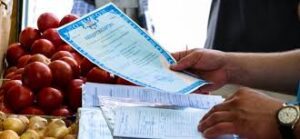
President of Ukraine Volodymyr Zelensky signed law No. 2246-IX (previously bill No. 7264 on uninterrupted production and supply of agricultural products during martial law), adopted by the Verkhovna Rada as a whole on May 12.
The relevant information was published on the parliamentary website on Wednesday.
As reported, the Verkhovna Rada simplified the export, import and transit of agricultural products to Ukraine during martial law, which will expand farmers’ access to fertilizers and genetic material of farm animals, as well as support the Ukrainian organic industry.
“The task of the state is to simplify farming under martial law as much as possible and reduce the bureaucratic burden on business and government bodies. This applies, in particular, to the state registration of pesticides and agrochemicals, which is extremely important during the spring sowing campaign in 2022. Also it is important to support niche sectors of agriculture and organic production,” the explanatory note to the document states.
Law No. 2246-IX abolishes until the end of martial law and for 90 days after its cancellation the state registration of agrochemicals imported into Ukraine, including some types of nitrogen fertilizers, ammonium nitrates, ammonia in aqueous solution, thiosulfates, potassium, calcium and aluminum phosphates, borates, chelate zinc and a number of other mineral fertilizers.
In addition to the simplified import of such types of fertilizers, the bill cancels the state registration procedure for their production, sale, use and advertising.
The law also allows producers of organic products to use the label “organic”, “biodynamic”, “biological”, “ecological”, “organic” until July 1, 2024, even if they are not operators of organic products in accordance with law 2496-VIII on turnover organic products.
This initiative allows Ukrainian producers of organic products that were producing according to EU standards, but did not meet the status of an operator of organic products according to Ukrainian standards, to switch to Ukrainian production standards without an additional transition period. It also allows them to qualify for government support.
The document expands the list of entities that can take samples and conduct phytosanitary examination, in particular, introduces until the end of martial law and by 90 after its cancellation a simplified procedure for involving employees of private laboratories in the examination, and also authorizes agronomists-inspectors to conduct such inspections to conduct an audit on certification.
In addition, Law No. 2246-IX allows the import to Ukraine of cargoes with live animals in transit through countries where there are cases of disease from the list of the International Epizootic Bureau (OIE). This will allow the Ukrainian livestock industry to access modern breeding genetic material from the EU countries and expand the diversity of breeding material of agricultural animals in Ukraine.
ANIMALS, FERTILIZERS, IMPORT, LAW, PHYTOSANITARY CERTIFICATES

During the period of martial law, the Verkhovna Rada has simplified the export, import and transit of agricultural products to Ukraine, which will expand the access of farmers to fertilizers and genetic material of farm animals, as well as support the Ukrainian organic industry.
Relevant bill No. 7264 on uninterrupted production and supply of agricultural products during martial law was adopted as a whole at a meeting on May 12 by the votes of 313 MPs, with the required 226 votes, MP Yaroslav Zhelezniak (the Holos faction) said on his Telegram channel on Thursday.
“The task of the state is to simplify farming under martial law as much as possible and reduce the bureaucratic burden on business and government bodies. This applies, in particular, to the state registration of pesticides and agrochemicals, which is extremely important during the spring sowing campaign in 2022. Also it is important to support niche agriculture and organic production,” according to an explanatory note to the bill.
The bill abolishes state registration of agrochemicals imported into Ukraine, including some types of nitrogen fertilizers, ammonium nitrates, ammonia in aqueous solution, thiosulfates, potassium, calcium and aluminum phosphates, borates, zinc chelate and a number of others mineral fertilizers until the end of martial law and for 90 days after its cancellation.
In addition to the simplified import of such types of fertilizers, the bill cancels the state registration procedure for their production, sale, use and advertising.
Bill No. 7264 also proposes, until July 1, 2024, to allow organic producers to use the label “organic,” “biodynamic,” “biological,” “ecological,” “organic,” even if they are not operators of organic products in accordance with law No. 2496-VIII on the turnover of organic products.
According to the explanatory note to the document, this initiative allows Ukrainian producers of organic products that produced according to EU standards, but did not meet the status of an operator of organic products according to Ukrainian standards, to switch to Ukrainian production standards without an additional transition period. It also allows them to qualify for government support.
The bill expands the list of entities that can take samples and conduct phytosanitary examination, in particular, introduces a simplified procedure for involving private laboratory employees in examination until the end of martial law and 90 years after it is canceled, and also authorizes agronomists-inspectors to conduct such inspections to conduct an audit on certification.
In addition, the bill allows the import of cargoes of live animals in transit through countries where there are cases of disease from the list of the World Organisation for Animal Health to Ukraine. According to the authors of the bill, this will allow the Ukrainian livestock industry to gain access to modern breeding genetic material from the EU countries and expand the diversity of breeding material of agricultural animals in Ukraine.
During the discussion of the document at the second reading, the MPs supported the amendment of MP Oleh Kulinich (the deputy group Dovira), specifying that state registration of pesticides is not required in cases where the active ingredient of the pesticide is marked in the EU Pesticides Database as permitted for use.
ANIMALS, FERTILIZERS, IMPORT, PHYTOSANITARY CERTIFICATES, RADA